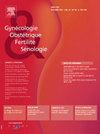Conduite à tenir devant un fœtus suspect d’une variation du développement génital (VDG)
IF 0.8
4区 医学
Q4 OBSTETRICS & GYNECOLOGY
引用次数: 0
Abstract
The management of a fetus suspected of having a difference in genital sexual development (DSD) is a complex situation. In cases of complete discordance or an unusual appearance of the external genitalia (EG), management always begins with a diagnostic morphological ultrasound. This ultrasound aims to provide detailed imaging of the EG and internal genitalia (IG), focusing on identifying the presence of Müllerian derivatives and detecting any associated malformations. During a multidisciplinary meeting, we should assess the appropriateness of determining the genetic sex through cell-free DNA analysis and to refer the patient to an expert center if necessary. These clinical situations include all atypical presentations of the genital organs with the inability to determine the phenotype, as well as any hypospadias associated with other genital organ involvement. Patients presenting with isolated posterior (or proximal) hypospadias also benefit from an assessment at an expert center. Isolated anterior and middle hypospadias (with negative genetic findings) are excluded from this protocol. Performing an invasive sampling is almost always indicated. The expert center provides the couple with information on the different variations of genital development and the perspectives of managing the child, explaining the recently proposed paradigm shift, according to the new French decree of November 15, 2022, in application of Article L-2131-6 of the Public Health Code, which now entails, in some of these situations, delayed surgical management. The diagnostic and prognostic uncertainty of the DSD is communicated to the couples. Multidisciplinary care is therefore essential to establish an accurate diagnosis, define the anatomical and functional prognosis, and propose the most appropriate surgical strategy, taking into account the associated morbidities, defining whether or not to adopt a surgical strategy, and providing the most suitable surgical approach, as well as supporting the couple and the child in dealing with this situation.
[怀疑胎儿性别发育差异(DSD)的处理]
怀疑胎儿有生殖器发育变异的处理是一个复杂的情况。在完全不一致或外生殖器(EG)的不寻常外观的情况下,管理总是从诊断形态超声开始。该超声旨在提供EG和内生殖器(IG)的详细成像,重点是识别勒氏衍生物的存在和检测任何相关的畸形。在多学科会议期间,我们应该评估通过无细胞DNA分析确定遗传性别的适当性,并在必要时将患者转介到专家中心。这些临床情况包括生殖器器官的所有非典型表现,无法确定表型,以及任何与其他生殖器受累相关的尿道下裂。出现孤立性后(或近端)尿道下裂的患者也可在专家中心进行评估。孤立的前尿道下裂和中尿道下裂(阴性遗传结果)被排除在本方案之外。几乎总是需要进行侵入性取样。专家中心向这对夫妇提供有关生殖发育的不同变化和管理孩子的观点的信息,解释最近提出的范式转变,根据2022年11月15日的新法令,适用于《公共卫生法》第L-2131-6条,现在在某些情况下需要延迟手术治疗。发育变异的诊断和预后的不确定性传达给夫妇。因此,多学科治疗对于建立准确的诊断,确定解剖和功能预后,提出最合适的手术策略,考虑相关的发病率,确定是否采用手术策略,提供最合适的手术方法,以及支持夫妇和孩子处理这种情况至关重要。
本文章由计算机程序翻译,如有差异,请以英文原文为准。
求助全文
约1分钟内获得全文
求助全文
来源期刊

Gynecologie Obstetrique Fertilite & Senologie
Medicine-Obstetrics and Gynecology
CiteScore
1.70
自引率
0.00%
发文量
170
期刊介绍:
Gynécologie Obstétrique Fertilité & Sénologie est un mensuel scientifique d''information et de formation destiné aux gynécologues, aux obstétriciens, aux sénologues et aux biologistes de la reproduction. La revue, dans ses éditoriaux, articles originaux, mises au point, lettres à la rédaction et autres rubriques, donne une information actualisée ayant trait à l''obstétrique et à la gynécologie et aux différentes spécialités développées à partir de ces deux pôles : médecine de la reproduction, médecine maternelle et fœtale, périnatalité, endocrinologie, chirurgie gynécologique, cancérologie pelvienne, sénologie, sexualité, psychosomatique…
 求助内容:
求助内容: 应助结果提醒方式:
应助结果提醒方式:


